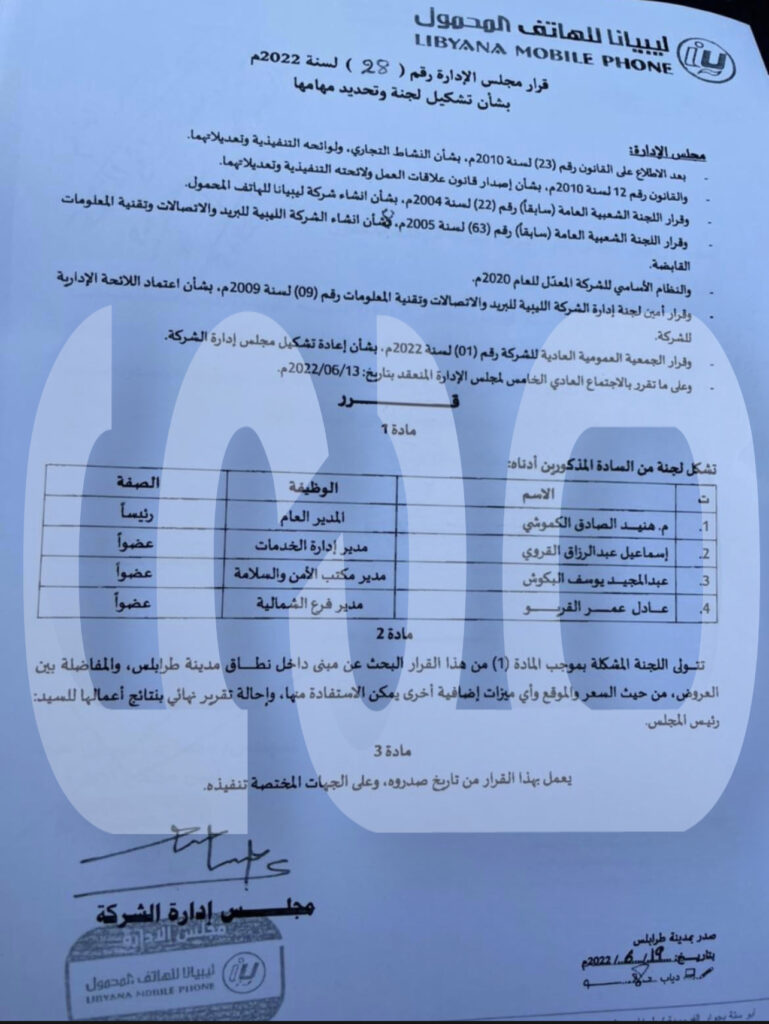The Research and Statistics Department of the Central Bank of Libya issued the quarterly periodic report that our source obtained exclusively on the most important financial data and indicators for commercial banks for the second quarter 2022, which is a “detailed report that contains many data and indicators for commercial banks operating in Libya.”
The financial data and indicators included in the report on commercial banks at the end of the second quarter 2022 witnessed some changes compared to what they were at the end of the second quarter 2021, as follows:
The number of banks operating in Libya and whose data are included in the report reached 20 banks (including the Libyan Dinar unit of the Libyan Foreign Bank) until the second quarter of 2022. These banks operate through 575 banking branches and agencies.
The total assets of commercial banks (excluding regular accounts) increased from 140.6 billion dinars at the end of the second quarter 2021 to about 142.6 billion dinars at the end of the second quarter 2022, with a growth rate of 1.4%. The liquid assets (amounting to 94.5 billion dinars) represented 66.3% of the total assets.
The ratio of liquid assets with commercial banks to total assets reached 66.3% at the end of the second quarter of 2022, most of which represent deposits with the Central Bank (on demand, including mandatory reserves as well as certificates of deposit).
The volume of loans to total deposits in the banking sector reached 21.8% at the end of the second quarter of 2022, which is a small percentage, while the ratio of deposits with banks to total assets was 68.1%.
The deposits of commercial banks (on demand and certificates of deposit) with the Central Bank, including the mandatory reserve, decreased from about 82.3 billion dinars at the end of the second quarter of 2021 to about 78.2 billion dinars at the end of the second quarter 2022, with a rate of 5.0%.
The total balance of credit granted by commercial banks increased from 17.8 billion dinars at the end of the second quarter 2021 to 21.2 billion dinars at the end of the second quarter 2022, with a growth rate of 19.1%. The loans and credit facilities granted to the total deposit liabilities accounted for 21.8%, and accounted for 14.8% of the total assets, and the balance of loans granted to the private sector at the end of the second quarter 2022 amounted to 15.2 billion dinars, and 71.7% of the total loans and facilities. The credit granted, while the balance of loans granted to the public sector constituted the remaining 28.3%, which amounted to about 6 billion dinars.
The coverage ratio of the provision for doubtful debts for the total loans and facilities granted reached 17.7% in the second quarter of 2022, compared to 20.2% in the second quarter of 2021.
Customers’ deposits with commercial banks decreased from 99.2 billion dinars at the end of the second quarter 2021, to 97.1 billion dinars at the end of the second quarter 2022, at a rate of 2.1%. Demand deposits constituted 80.1% of the total deposits, while time deposits constituted a percentage of 19.6% of total deposits, while savings deposits constituted only 0.3% of total deposits.
With regard to the distribution of these deposits, the private sector deposits at the end of the second quarter 2022 amounted to 56.5 billion dinars, or 58.2% of the total deposits, while the balance of public and government sector deposits constituted the remaining 41.8%, which is 40.6 billion dinars, of which 27.6 billion dinars deposits for public sector companies and institutions, and about 13.1 billion dinars in government deposits.
Total equity in commercial banks increased from 6.7 billion dinars at the end of the second quarter of 2021 to 7.9 billion dinars at the end of the second quarter of 2022, at a rate of 19.1%.
The profits of commercial banks (before deduction of provisions and taxes) during the second quarter of 2022 decreased by 18.3% to reach 673.7 million dinars, compared to what they were during the second quarter of 2021, which recorded about 824.5 million dinars.
The balance of cash in safes and clearing accounts increased by 2.3 billion dinars, which is 24.3%, to reach 11.7 billion dinars at the end of the second quarter 2022, compared to 9.4 billion dinars at the end of the second quarter 2021, where the balance of cash in bank treasuries increased by 417.7 million dinars, while the item clearing accounts increased by 1.9 billion dinars at the end of the second quarter of 2022 compared to what it was in the same period of the second quarter of 2021.
The balance of commercial banks’ deposits with the Central Bank and other banks and between them amounted to about 90.4 billion dinars at the end of the second quarter 2022, compared to 94.5 billion dinars at the end of the second quarter 2021, a decrease of 4.1 billion dinars, as a result of a decrease in their deposits with the Central Bank as well as their deposits among them by about 356.6 million dinars, in addition to a decrease in its deposits with the Libyan Foreign Bank.
The total item of the investment balance of commercial banks at the end of the second quarter 2022 scored about 4.6 billion dinars, compared to 4.5 billion dinars at the end of the second quarter 2021, with a growth rate of 2.7%. This increase came as a result of the increase in the item of other investments.
The capital adequacy ratio recorded 17.4%, as the Libyan banking sector enjoys high capital adequacy, sufficient to face any risks that may occur, as its ratio ranged between 10.7% and 19.2% during the period (2012 – Q2 2022), which is generally higher and with a comfortable margin of the percentage specified by Basel Committee on Banking Supervision, which is 8 %.



















